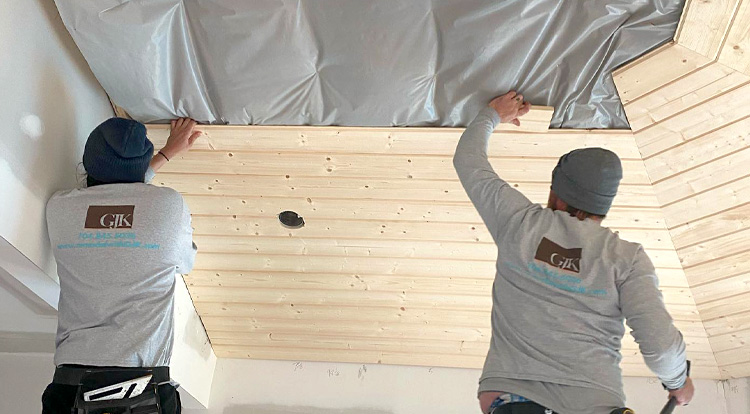How to Finance a Home Renovation in Charlotte, NC
Are you a Charlotte homeowner dreaming of a fresh new look for your kitchen, an expanded living space or perhaps a complete home makeover but don’t know how to finance a home renovation? Renovating your home not only makes your space more enjoyable and tailored to your tastes, but it can also significantly increase the value of your property. However, one of the biggest hurdles to achieving your dream space is figuring out how to finance the renovation, which is why we wrote this overview of various financing options.
Using Equity to Renovate
Home equity, the value of your property minus any mortgage owed, can be an excellent resource to tap into for renovation funds. Exploring this option can unlock your home’s potential by using its own value to enhance and improve.
Home Equity Lines of Credit (HELOC)
If you have built up equity in your home through regular mortgage payments or increased property value over time, a Home Equity Line of Credit (HELOC) can provide you with a flexible line of credit. This financial tool operates similarly to a credit card but is secured by the value of your property. You can access funds (as needed) for various expenses, such as home renovations, debt consolidation or unexpected expenses. HELOCs typically offer lower interest rates than other forms of credit, making them a cost-effective option for leveraging your home equity.
Home Equity Loans
Similarly, a home equity loan allows you to borrow a lump sum using the equity you’ve accumulated in your home. The key difference is that this type of loan comes as one large payout rather than revolving credit.
Cash-out Refinance
A cash-out refinance is another valuable option for leveraging your home’s equity. With this strategy, you can refinance your existing mortgage for an amount higher than your current balance. The additional funds obtained can then be utilized for renovations and other financial endeavors, providing you with a flexible and efficient way to manage your resources.

Paying for Renovations Without Equity
For newer homeowners or those who haven’t built up much equity, there are still viable options to finance renovations:
Cash
If you have substantial savings set aside, using cash to pay for your renovation upfront can be the most straightforward and interest-free method. This approach allows you to avoid taking on debt or dealing with interest charges, giving you full control over your renovation expenses and ensuring a smoother financial process. By leveraging your savings, you can invest in your home without incurring additional financial burdens, which can be more cost-effective.
Personal Loans
Personal loans can offer a valuable financial solution, especially when secured at a low-interest rate. These loans are usually unsecured, meaning they don’t require collateral, and are approved based on your creditworthiness, which reflects your ability to repay the loan. By maintaining a good credit score and history, you can increase your chances of securing favorable terms and conditions for personal loans.
Credit Cards
When it comes to utilizing credit cards, it is generally recommended to reserve them for smaller-scale projects or temporary financial needs. This is primarily because credit cards tend to carry relatively high-interest rates (especially today), making them more suitable for short-term financing rather than long-term financial commitments.
How Much Do Home Renovations Cost?
Home renovation costs can vary widely based on the scale and specifics of the project. Here’s a table that breaks down average costs for common renovation projects in Charlotte, NC:
| Project | Average Cost |
| Kitchen – Midrange | $76,024 |
| Kitchen – Upscale | $152,144 |
| Bathroom – Midrange | $24,800 |
| Bathroom – Upscale | $77,261 |
| Bathroom – Universal Design | $32,151 |
| Home Additions | $154,090 |
Source: 2023 Cost vs. Value Report
Remember, the above figures are just averages to give you a general idea. Get more details in our Charlotte Area Remodeling Cost Guide.
Tips for Planning Home Renovations
When you decide to renovate, planning is key to ensuring that you stay within budget and get a good return on your investment.
- Decide How Much You Can Afford: Sit down and realistically assess how much you can allocate for your renovation. Consider any existing debts, savings and future expenses, such as college or wedding expenses or a vacation) to determine how much you can comfortably pay without compromising your financial stability.
- Prioritize Your Renovations: List all the renovations you want to make and prioritize them based on importance and budget limitations. This will help you focus on what’s most important to achieve your dream space without overspending.
- Consider ROI: Some renovations can significantly increase the value of your home. Kitchens and bathrooms provide some of the best returns on investment.
Before committing to any financing plan for your home renovation, do thorough research and consider speaking with a financial advisor. Financing a home renovation can be a significant investment, and it’s important to find a strategy that aligns with your financial situation and goals.
Are you ready to begin a home remodeling project that gives you a Life Remodeled? Start by familiarizing yourself with our process and then schedule a consultation.
—
Disclaimer: The information provided in this article is for general informational purposes only. It should not be considered as financial advice. We strongly recommend that you consult with your financial advisor, accountant or any other professional financial team to obtain specific advice tailored to your situation before making any decisions regarding financing your home renovation. The market is subject to changes and this article does not acknowledge specific circumstances that could affect financial decisions.